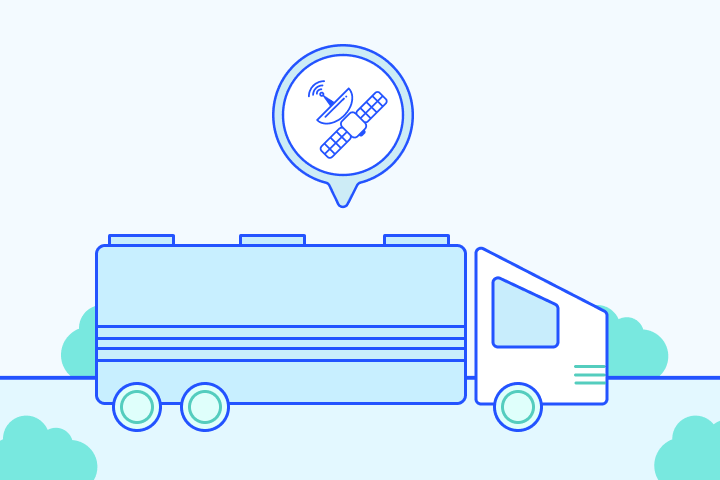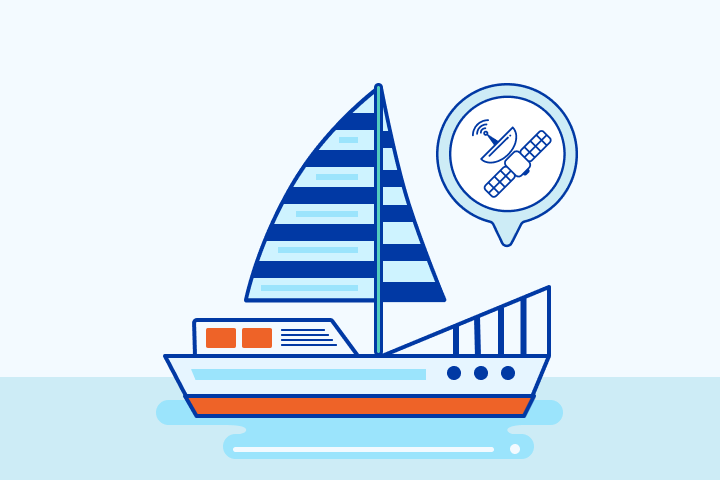Best RV Internet Options 2026
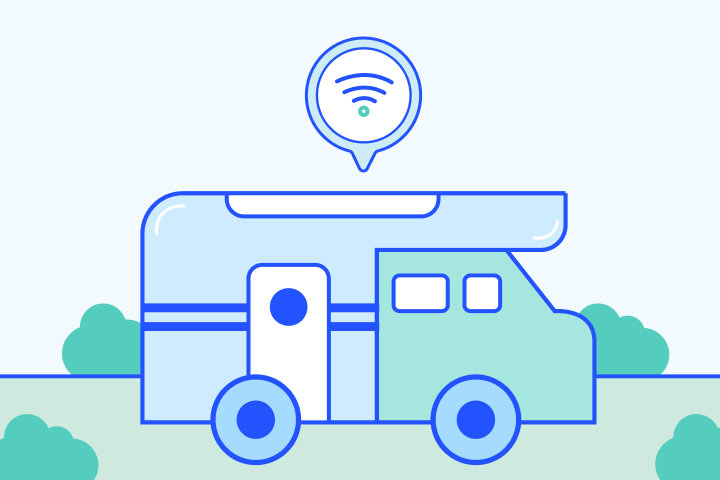
HighSpeedOptions prides itself on providing honest, quality content. While we may be compensated when you make a purchase through links on our site, all opinions are our own. Here's how we make money.
Table of Contents
Traveling around in an RV is a fantastic way to explore and see the world, and even earn a living. In 2025, having reliable internet is essential. Here are the latest options for RV internet in 2025, cost comparisons, and what you need to know to stay connected while traveling.
The Challenge of RV Internet
Staying connected is one of RV life’s biggest challenges—whether you’re working remotely, streaming video, navigating, or “road-schooling” your kids. You might encounter areas with weak signals or even no signal at all. Using cellular data on your smartphone is convenient. But it often lacks the speed and reliability needed for activities like streaming or video conferencing.
So, what options do you have along the journey in your RV?
Finding reliable internet on the road can be frustrating, but don’t worry—there are solutions to keep you connected.
Several internet providers offer solutions that are ideal for RVers. We’ve compiled a guide to finding the best RV internet options to keep you connected while on the move, which includes several types of internet service.
Summary of RV Internet Solutions
| RV Internet Options 2025 | Pros | Cons |
| Mobile Hotspot | Affordable, portable | Potential data caps |
| Satellite Internet | Widely available, reliable speeds | Expensive, weather-dependent |
| Public Campground WiFi | Often free | Unreliable, security risks |
| WiFi Extenders & Boosters | Improved connectivity | Additional cost |
| RV Internet Options 2025 | Mobile Hotspot |
| Pros | Affordable, portable |
| Cons | Potential data caps |
| RV Internet Options 2025 | Satellite Internet |
| Pros | Widely available, reliable speeds |
| Cons | Expensive, weather-dependent |
| RV Internet Options 2025 | Public Campground WiFi |
| Pros | Often free |
| Cons | Unreliable, security risks |
| RV Internet Options 2025 | WiFi Extenders & Boosters |
| Pros | Improved connectivity |
| Cons | Additional cost |
- Finding reliable RV internet can be challenging, especially if you’re off the beaten path.
- Satellite internet is a great option, but there are other RV internet options.
- Want to make the most of your service? Check out our tips for optimizing RV internet, including booster and extender suggestions.
- Costs vary depending on location and connection type. Check out our alternative ideas for RV internet service.
- Still have questions? Check out our RV Internet FAQs for more information.

What are the Best Internet Options for RV in 2025?
RVers have a few choices for internet access. They include mobile hotspots, satellite internet, public WiFi, and internet provider hotspots. Here we discuss how they work and how best to use them on the road.

Mobile Hotspots
Yes, mobile hotspots are a popular and reliable way for RVers to get online. They are useful when you find yourself far from reliable and secure public WiFi sources.
One of the best mobile hotspot products is the Wireless Home Internet device from EarthLink. might be an ideal mobile solution for RVers. It was designed for rural users as an alternative to satellite internet and DSL internet. Don’t let the name dissuade you; it is a portable hotspot device that works well on the road. You will need to have 120V outlets in your RV and be within a cellular network.
- Best internet protection
- Unlimited data included
- No credit checks
EarthLink’s Wireless Home Internet at a Glance
- It accesses available LTE, 4G, and 5G networks.
- It requires 120V power and cellular coverage to use it on the road.
- It can connect multiple devices, but too many can reduce speed and performance.
Keep in mind that the provider may set data caps. If so, it may be more cost-efficient to get an unlimited plan if one is offered.

Satellite Internet
Satellite internet is becoming a favorite among RVers and digital nomads, especially with Starlink’s expanded coverage. Starlink also offers a portable satellite internet product perfectly suited for those on the road.
Starlink Roam comes in two plans: 50GB and Unlimited. As the name implies, the Unlimited plan includes unlimited internet data at a higher monthly cost. The 50GB plan costs less but has data caps. While convenient and reliable, be prepared to purchase equipment upfront for any Starlink product. What to consider with Starlink satellite internet for RVs:
- The 50GB plan is only compatible with the Starlink Mini equipment and speed tops out at 100 Mbps.
- Roam does not support internet connectivity while in motion, and availability may vary by location.
- Fast satellite internet
- Ideal for rural areas
- Up to 3x faster than DSL*

Public WiFi
In most places, you’ll have access to public WiFi—whether it’s in a campground, Starbucks, rest or truck stop, or a public library. Using public WiFi can be a great way to save on internet costs, especially if you plan to stay in campgrounds and RV parks that offer it.
What are the Pros and Cons of Using Public WiFi?
Pros
Generally free to use
Very common in places like campgrounds, state and national parks, and restaurants
Other than your device, there are no equipment costs
Cons
Performance can be slow and inadequate for activities such as streaming video or Zoom calls
Public WiFi networks typically have very poor internet security and privacy
Service can be throttled to accommodate more connections

Internet Provider WiFi Hotspots
Many internet providers have nationwide hotspots that you can access through the service at your home address. Although they likely aren’t available in the wilderness, they are readily available in cities and towns throughout the country.
Xfinity internet has over 8 million hotspots nationwide. It’s a sophisticated network made possible through the use of Xfinity customers’ gateways, as well as partnering internet providers. Xfinity customers can access the hotspots for free. Non-customers may need to pay a small fee for access.
- Same-day installations
- 8+ million free WiFi hotspots
- Unlimited data available
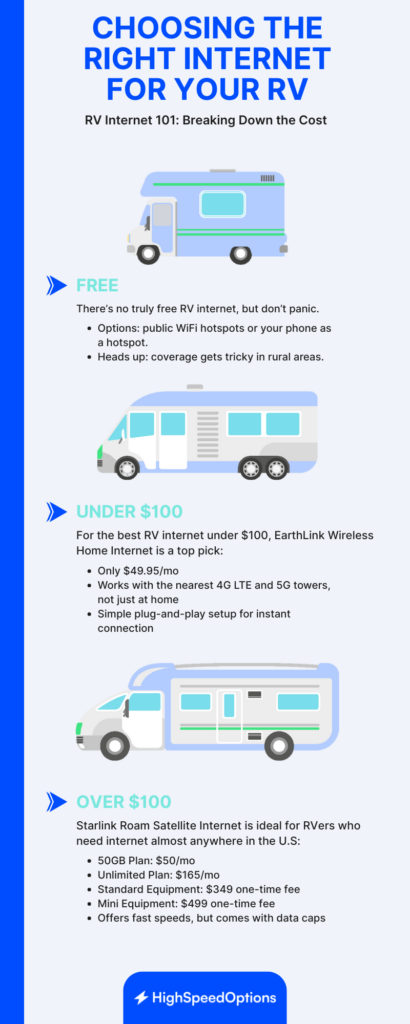
How can I maximize my RV internet?
Once you have a reliable internet connection in your RV, here are a few tips to get the most out of it:
Subscribe to Unlimited Data
Spring for an unlimited data plan, even if it’s a bit more expensive. Doing so can cost less than paying for data usage above your provider’s data caps. If you know that you’ll need more than the limit allows, it’s typically less expensive per month to go with unlimited data.

Cellular Signal Booster
A cellular signal booster is a device that increases the signal strength within its proximity. They are particularly helpful on network fringes where the signal weakens. They will not work in remote areas without a cellular network signal.
What to know about cellular signal boosters for RV internet:
- They are expensive, sometimes as much as $500.
- They can cause interference and destabilize your connection if other networks or boosters are nearby.
- Check with your carrier. They may not allow boosters or use an incompatible frequency.
- Depending on the stability of the signal, a booster can quickly drain your device’s battery.
- Monitor the signal. Turn it off if the tower signal is strong enough.
WiFi Extender
A WiFi extender – or repeater – is another gadget that can help improve the connection in your RV when you’re using a campground or public WiFi. An extender rebroadcasts the WiFi signal it’s receiving to create a stronger and faster signal. Be sure to run an internet speed test afterward to gauge the performance of your internet connection.
Some RV manufacturers even integrate them into their recreational vehicle models, or are at least an option to have installed. Since WiFi extenders connect to public networks, we recommend reviewing our tips on security and privacy.
How Much Does RV Internet Cost in 2025?
As you can probably guess, the monthly costs to get internet service while on the road in your RV vary. There’s free public WiFi, somewhat costly satellite internet, and everything in between.
Free Options
- Many internet providers offer access to WiFi hotspots that are widely available nationwide, except in some remote and rural locations.
- You can also use your smartphone as a hotspot to get internet access while exploring in your RV. These aren’t “free” services, but are included as part of your monthly cell service.
Under $100
- EarthLink’s Wireless Home Internet service starts at just $49.95/month. It’s an affordable option for those looking for a portable WiFi device. Choose a data plan that works with your needs, plug it in, and connect to the fastest cellular signal possible in your area.
Over $100
- Starlink Roam satellite internet service for RVs is ideal for nomads and recreational vehicle owners. It’s fast and available almost anywhere in the United States, but it comes at a cost.
| Starlink Roam Satellite Service (2025) | Cost |
| 50GB Plan | $50/month |
| Unlimited Plan | $165/month |
| Standard Equipment | One-time fee of $349 |
| Mini Equipment | One-time fee of $499 |
| Starlink Roam Satellite Service (2025) | 50GB Plan |
| Cost | $50/month |
| Starlink Roam Satellite Service (2025) | Unlimited Plan |
| Cost | $165/month |
| Starlink Roam Satellite Service (2025) | Standard Equipment |
| Cost | One-time fee of $349 |
| Starlink Roam Satellite Service (2025) | Mini Equipment |
| Cost | One-time fee of $499 |
Know Before You Go: RV Internet Data Caps and Costs
Some internet providers implement data caps. This simply means that you have an allotment of “free” data to use during a month. You won’t lose service if you reach that amount, but some providers may throttle, or slow down, your internet speed once you do.
What is most important to know in this scenario is that data overage costs can be very expensive. Any type of internet service may come with data caps. The two most common are satellite internet and mobile hotspots, especially if you’re using your smartphone’s hotspot feature.
Before you begin travelling around in your RV, find out if:
- Your provider imposes data caps;
- How much data you get;
- And, what overage fees may apply.
It may be less expensive to upgrade your service to unlimited data if the option is available. And you should consider it if you know your internet lifestyle is incompatible with the data limit. Having unlimited data alleviates the concern of incurring expensive overage costs and monitoring and budgeting your usage.
How to Keep RV Internet Secure and Private
There are several ways to enhance internet security and privacy for RV. These tips help protect any connection; they are essential for protecting yourself on public WiFi. If you do use the WiFi at a campground or RV park, keep these in mind to secure your device and keep your sensitive information safe:
- Use a VPN (Virtual Private Network) for a secure, encrypted connection
- Enable two-factor authentication (2FA) on your accounts, especially on any that store sensitive information (work-related accounts, financial, medical, billing records, etc.)
- Use a firewall and antivirus protection on devices that support them
- Avoid sharing sensitive information over public WiFi
- Keep your device OS updated, along with all software and apps
- Disable file sharing on your device
- Direct your device to forget the network when you’re done with it
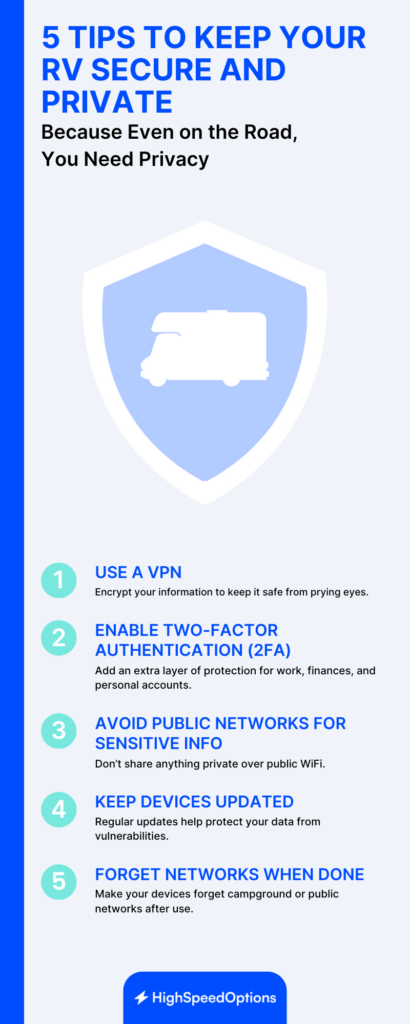
Final Thoughts About RV Internet
You’ve got internet access options, but there are a few things to keep in mind:
- Cellular data networks aren’t available everywhere and can be slower in remote areas.
- Mobile hotspots, which rely on cellular networks, are convenient and often built into your smartphone’s operating system.
- Public WiFi depends on the type of internet it’s connected to and how many others are using it at the same time, and presents security and privacy risks.
Satellite internet may be the best choice for internet availability and reliability while travelling in your RV. It is the most expensive solution offered here and its performance can be affected by severe weather, but it will provide the fastest internet speeds and most flexibility.

RV Internet FAQs
HughesNet internet or Viasat internet are options for your RV if you’re staying in one place for longer than a few days. Each time you change locations, you’ll need to pack it up and then set it up and calibrate it for optimal performance. Plus, some providers may limit the number of times you can change locations.
Even if they both get the job done, how you travel and what your goals are may impact whether you choose a cellular hotspot or satellite internet. A mobile hotspot device is great for RVers who don’t stray too far from civilization and need fast speeds.
On the other hand, satellite internet is great for travelers who like to stay in remote places that most internet providers don’t cover. Since they tend to be slower, satellites can also be a great option if you mainly use the internet for less-intensive activities like navigation or sending emails.
Naturally, the cost of getting internet in your RV can vary based on your internet needs, how often you need it, and whether you purchase any gadgets like boosters or extenders. Since you likely already have a cellular plan, it may come at no additional cost, but be mindful of data limits.
A mobile hotspot for use with your cellular network, expect to pay between $150 – 500 for the device (plus any associated fees/usage rates). If you don’t need high-speed internet, the hotspot on your phone may suffice and be adequate to connect a couple of other devices.
Yes! Starlink provides a satellite internet service for RVs. With the equipment purchase and an additional $50 per month, you can hit the road and not lose connectivity with Starlink’s new RV mobile service, Roam. Keep in mind that Starlink service can be expensive, requiring pricey equipment that may experience spotty coverage in some areas, and you cannot use it while you’re driving.
The best internet for full-time RVers depends on where you travel and your budget. Mobile hotspots like EarthLink’s Wireless Home Internet work well in urban or suburban areas. Starlink Roam is best for rural and off-grid locations due to its nationwide satellite coverage.
Internet service in national parks is often limited, but it is possible in some areas. Larger or more visited parks may offer public WiFi at visitor centers, campgrounds, or lodges. However, speeds are typically slow and unreliable. If you need consistent internet, consider bringing a mobile hotspot or using satellite internet like Starlink Roam for better coverage.
If cellular, satellite, or public WiFi aren’t cutting it, you’ve got a few alternatives. Try renting a desk at a co-working space in town for reliable high-speed internet—great for short stays. Visiting friends? Ask to hop on their WiFi. It’s usually faster and more secure than public options. And if you’re parked at a campground long-term, check if they offer cable internet or DSL internet. Some do, especially for monthly guests, though you might need to cover installation fees. Always worth asking!
Find providers in your area

Table of Contents








